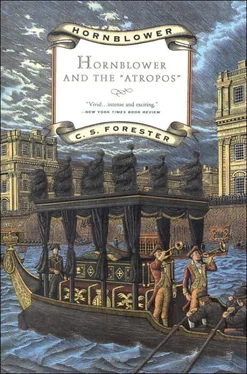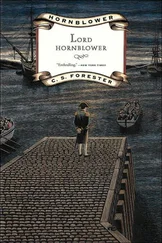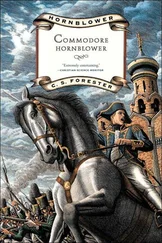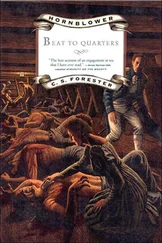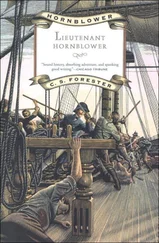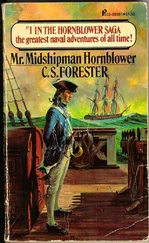Cecil S. Forester
Hornblower and the Atropos
Having climbed up through the locks, the canal boat was now winding over the pleasant Cotswold country. Hornblower was bubbling with good spirits, on his way to take up a new command, seeing new sights, travelling in an entirely new way, at a moment when the entirely unpredictable English weather had decided to stage a clear sunny day in the middle of December. This was a delightful way of travelling, despite the cold.
“Your pardon for a moment, ma’am,” said Hornblower.
Maria, with the sleeping little Horatio in her arms, gave a sigh at her husband’s restlessness and shifted her knees to allow him passage, and he rose under the restricted height of the first class cabin and stepped out through the forward door into the open bow of the passage-boat. Here he could stand on his sea chest and look round him It was a queer craft, fully seventy feet long and, judging by eye as he looked aft, he would think hardly five feet in beam—the same proportions as had the crazy dugout canoes he had seen in use in the West Indies. Her draught must be less than a foot; that was clear as she tore along behind the cantering horses at a speed that must certainly be all of eight knots—nine miles an hour he told himself, hurriedly, for that was the way they measured speeds here inland.
The passageboat was making her way from Gloucester to London along the Thames and Severn Canal; going far more smoothly than the stage coach, it was very nearly as fast and decidedly cheaper, at a penny a mile, even in the first class. He and Maria, with the child, were the only firstclass passengers, and the boatman, when Hornblower had paid the fares, had cocked an eye at Maria’s condition and had said that by rights they ought to pay two children’s fares instead of one. Maria had snorted with disdain at such vulgarity, while the onlookers chuckled.
Standing on his sea chest, Hornblower could look over the canal banks, at the grey stone boundary walls and the grey stone farms. The rhythmic sound of the hoofs of the cantering tow horses accentuated the smoothness of the travel; the boat itself made hardly a sound as it slid along over the surface of the water—Hornblower noticed that the boatmen had the trick of lifting the bows, by a sudden acceleration, on to the crest of the bow wave raised by her passage, and retaining them there. This reduced turbulence in the canal to a minimum; it was only when he looked aft that he could see, far back, the reeds at the banks bowing and straightening again long after they had gone by. It was this trick that made the fantastic speed possible. The cantering horses maintained their nine miles an hour, being changed every half hour. There were two tow lines, attached to timber heads at bow and stern; one boatman rode as postillion on the rear horse, controlling the lead horse with shouts and the cracking of his whip. In the stern sat the other boatman, surly and with one hand missing and replaced by a hook; with the other he held the tiller and steered the boat round the curves with a skill that Hornblower admired.
A sudden ringing of the horses’ hoofs on stone warned Hornblower just in time. The horses were dashing, without any slackening of pace, under a low bridge, where the towpath, cramped between the water and the arch, gave them barely room to pass. The mounted boatman buried his face in his horse’s mane to pass under; Hornblower had just time to leap down from his sea chest and seat himself as the bridge hurried over him. Hornblower heard the helmsman’s loud laugh at his momentary discomfiture.
“You learn to move fast in a canal boat, Captain,” the steersman called to him from his place by the tiller. “Two dozen for the last man off the yard! None o’ that here on Cotswold, Captain, but a broken head for you if you don’t look lively.”
“Don’t let that fellow be so rude to you, Horatio,” said Maria from the cabin. “Can’t you stop him?”
“Not so easy, dear,” replied Hornblower. “It’s he who’s captain of this craft, and I’m only a passenger.”
“Well, if you can’t stop him, come in here where he can’t be rude to you.”
“Yes, my dear, in a minute.”
Hornblower chose to risk the jeers of the boatman rather than miss looking round him; this was the best opportunity he had had of watching the working of the canals which in the last thirty years had changed the economic face of England. And not far ahead was Sapperton Tunnel, the engineering marvel of the age, the greatest achievement of the new science. He certainly wanted to see that. Let the steersman laugh his head off if he wanted to. He must be an old sailor, discharged as disabled by the loss of his hand. It must be a wonderful experience for him to have a naval captain under his command.
The grey stone tower of a lockhouse showed ahead, with the minute figure of the lockkeeper opening the gates. A yell from the postillion-boatman checked the speed of the horses; the boat glided on, its speed diminishing greatly as the bows slid off the bow wave. As the boat entered the lock the onehanded steersman leaped ashore with a line which he flipped dexterously round a bollard; a smart tug or two took most of the way off the boat, and the boatman, running forward, secured the line to another bollard.
“Heave us that line, Captain,” he cried, and Hornblower obediently threw up the bow line for him to secure forward. The law of the sea applied equally in inland waters—the ship first and personal dignity a long way second.
Already the lockkeeper was closing the gates behind them and the lockkeeper’s wife was opening the paddles of the upper gate, the water swirling in. The lower gates closed with a crash with the mounting pressure, and the boat rose with the gurgling water. The horses were changed in a twinkling; the postillion scrambled into his saddle, and proceeded to tilt a black bottle against his lips during the remaining few seconds while the lock filled. The steersman was casting off the lines—Hornblower took the bowline from him—and the lockkeeper’s wife was thrusting at one upper gate while the lockkeeper, running up from the lower gate, thrust at the other. The postillion yelled and cracked his whip, the boat sprang forward while the helmsman leaped to his place astern, and they were off again with not a second wasted. Assuredly this canal traffic was a miracle of modernity, and it was gratifying to be on board the very fastest of the canal boats, the Queen Charlotte , that took priority over all other traffic. On her bow she carried a glittering scytheblade as the proud symbol of her superior importance. It would sever the towline of any approaching boat which did not drop her line quickly enough to let her through. The two score of farmers’ wives and wenches who sat aft in the second class with their chickens and ducks and eggs and butter were all of them travelling as much as twenty miles to market, in the confident expectation of returning the same day. Quite astonishing.
Here, as they climbed to the summit level, lock succeeded lock at frequent intervals, and at each the postillion held his black bottle to his lips, and his yells to his horses became more raucous and his whip-cracking more continuous. Hornblower obediently handed the bowline at each lock, despite Maria’s urgings to the contrary.
“My dear,” said Hornblower, “we save time if I do.”
“But it isn’t right,” said Maria. “He knows you’re a captain in the Navy.”
“He knows it too well,” said Hornblower with a lopsided smile. “And after all I have a command to take up.”
“As if it couldn’t wait,” snorted Maria.
It was hard to make Maria understand that to a captain his command was all in all, that he wished to lose not an hour, not a minute, in his journey to assume command of his sloop of war in London River; he was yearning to see what Atropos was like, with the mingled hope and apprehension that might be expected of an Oriental bridegroom affianced to a veiled bride—that was not a simile that it would be wise to mention to Maria, though.
Читать дальше
